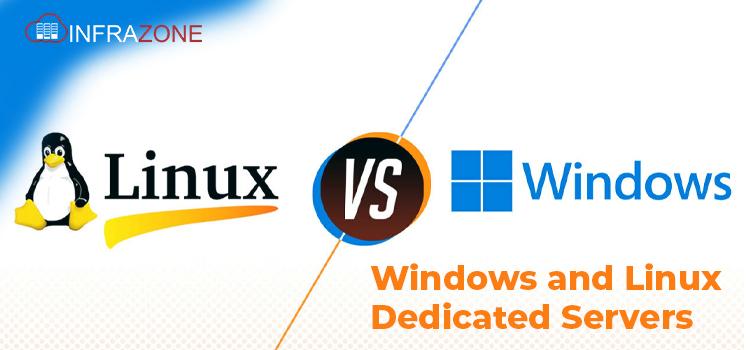
When it comes to hosting websites or applications, one important decision to make is the choice between a Windows dedicated serverand a Linux dedicated server. Both options have their unique features and benefits, and understanding the differences between them can help you make an informed decision that aligns with your specific needs. In this article, we will explore the key distinctions between Windows and Linux dedicated servers, including their operating systems, compatibility, security, performance, and software support.
Understanding the Differences Between Windows and Linux Dedicated Servers
Operating Systems:
The fundamental difference between Windows and Linux Cloud Hosting dedicated servers lies in their operating systems. Windows servers are powered by Microsoft Windows Server, while Linux servers run on various distributions such as Ubuntu, CentOS, or Debian. Windows Server provides a user-friendly interface and seamless integration with other Microsoft products, making it an ideal choice for organizations already utilizing Microsoft technologies. Linux distributions, on the other hand, offer robust command-line capabilities and greater flexibility, catering to developers and tech-savvy users.
Compatibility:
Another crucial factor to consider is the compatibility of the dedicated cloud server with your applications and software stack. Windows dedicated servers excel in running applications developed for the Windows environment, such as ASP.NET, .NET Core, and Microsoft SQL Server. They are also more compatible with proprietary software and commercial applications. Linux dedicated servers, however, are known for their wide compatibility with open-source software, including PHP, Python, Perl, and MySQL. They are particularly popular for hosting websites powered by content management systems like WordPress and Drupal
Security:
Security is of paramount importance when it comes to hosting a website or application. Windows and Linux dedicated servers have different security models. Windows servers benefit from robust security features provided by Microsoft, such as Windows Defender and Windows Firewall, along with regular security updates. They also offer Active Directory for centralized user management. Linux servers, on the other hand, are renowned for their security and stability. The open-source nature of Linux allows for frequent security audits and swift patching of vulnerabilities. Additionally, the strong permission system and limited user privileges inherent in Linux contribute to its security strengths
Performance:
Performance is a critical consideration when selecting a dedicated server. Windows dedicated servers are optimized for running applications developed on the Windows platform, resulting in excellent performance for running applications developed on the Windows platform, resulting in excellent performance for Windows-specific workloads. They also offer seamless integration with Microsoft technologies, such as IIS (Internet Information Services) for web hosting. Linux dedicated servers, known for their stability and efficiency, often outperform Windows servers in terms of speed and resource utilization. Their lightweight nature and ability to run on minimal hardware requirements make them ideal for high-performance computing and resource-intensive applications
Software Support:
Software support is a crucial aspect to consider, as it determines the availability of tools and frameworks for your server environment. Windows dedicated servers benefit from extensive commercial software support, with a wide range of licensed applications and enterprise solutions available. They are also well-suited for Microsoft development frameworks and tools. Linux dedicated servers have a vast open-source software ecosystem, offering a plethora of free tools, frameworks, and libraries. The Linux community is highly active, providing constant updates and support, making it an attractive choice for developers and organizations that prioritize open-source solutions
Conclusion:
Choosing between a Windows and Linux dedicated server ultimately depends on your specific requirements and preferences. Windows servers excel in compatibility with Microsoft technologies, while Linux servers offer flexibility, security, and a vast open-source ecosystem. By understanding the differences in operating systems, compatibility, security, performance, and software support, you can make an informed decision that aligns with your hosting needs. Consider your application stack, required features, and long-term goals to select the dedicated server that will empower your online presence and provide the best value for your investment.
